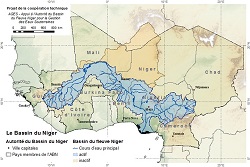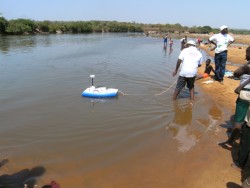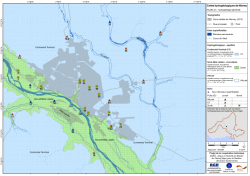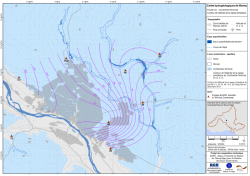TC Niger Basin: Support in Groundwater Management to the Niger Basin Authority
Report of the project:
Background:
The Niger River flows through western Africa over a length of 4,200 km and is the third longest river in Africa. Together with the associated aquifers, he constitutes one of the most important water resources of the continent. Its catchment area spreads over some 2,100,000 km² and is about six times larger than Germany. It extends across ten countries: Algeria, Benin, Burkina Faso, Ivory Coast, Guinea, Cameroon, Mali, Niger, Nigeria and Chad. Most of the water resources in the Niger basin are groundwater, which is used extensively in particular for households, agriculture and livestock. Groundwater management has not been widely applied so far neither at national nor at regional level. The Niger Basin Authority (NBA) established in 1980 with nine member states based in Niamey, Niger, has been engaged in transboundary surface water management for many years, but groundwater has never been an issue. The NBA is thus the appropriate starting point to establish groundwater management and so raise its staff awareness for the topic.
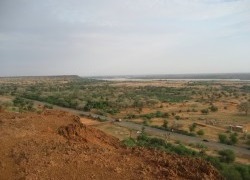 Fig. 2: The Niger River near Niamey
Fig. 2: The Niger River near Niamey
The Project:
As part of the "Integrated Water Resources Management ABN" program of the German Development Cooperation, this project supports the Niger Basin Authority in the insertion of measures for groundwater protection and sustainable use of groundwater in their IWRM. The project activities aim to develop the necessary institutional capacities in groundwater management with the qualification of the NBA staff playing an important role. During the project the NBA and its focal structures should be sensitized on groundwater management issues, while the authority should start implementing measures with transboundary effects. The project activities include:
- Collection and assessment of groundwater data and maps in the Niger basin in order to develop a groundwater database as well as a basis for the preparation of a hydrogeological map for the basin
- Identification of transboundary regions with conflict-ridden groundwater problems
- Support of first measures to improve groundwater management in selected project areas
- Capacity building at all levels (education, training programs, know-how-transfer)
The final goal of the project is to improve the living conditions of the whole population in the Niger River basin.
Methodology:
An important project activity is the support of first measures to improve the groundwater management in selected project areas. A first project area has been selected, which extends over the city area of Niamey in the Niger Republic. Core activity of the project is to establish a groundwater monitoring net in the project area that should also serve as training center for the staff of all 9 member countries.
The single tasks to be performed in this activity are:
1) Set of a monitoring net consisting of existing wells, including the measurement of their heights by means of a DGPS, aimed to:
- Compile groundwater contour maps as a basis for the investigation of all different aquifers in the area of Niamey and their possible exchange with surface water from the Niger River
2) Establishment and regular performance of groundwater measurement campaigns to:
- Investigate the different aquifers in the area of Niamey and propose adequate measures for groundwater management
- Identification of groundwater related problems (e.g. possible contaminations) in relation to the use of the resource by the population
- Education and training on the job of NBA staff (capacity building)
- Creation of a data base for future groundwater modeling
Activities that are conducted outside the project area:
- Runoff measurements during extreme low discharge (water depth < 40 cm) on the headwaters (Ivory Coast, Guinea) and middle reaches (Niger, Benin) of the Niger River and its tributaries by means of acoustic flow measurements by the Doppler principle (ADP) including onsite training of the NBA staff.
Results:
In the Niamey area, there are three important aquifers:
- Basement "Méta-Liptako": a granite-gneiss complex of Precambrian age; it is a fractured aquifer
- "Continental Terminal" (CT): a sandstone formation of Eocene - Pliocene age generated over a long sedimentation period; the CT acts as a porous aquifer
- Alluvial sands: low compacted sands of Quaternary age deposited by the Niger River; the alluvial sands act as porous aquifer of local expansion.
The groundwater monitoring net considers the three aquifers (see Fig. 5). A separated groundwater contour map has been prepared for each aquifer after each monitoring campaign (see Fig. 6). Five groundwater monitoring campaigns on quarterly basis have been carried out so far. Groundwater appears to flow differently depending on the aquifer considered. Only the alluvial aquifer shows an interaction with the Niger River. All campaigns showed high bacteria loads (coliforms and enterococci) of more than 2,000 colony forming units (CFU) per 100 mL, as well as large nitrate concentrations of more than 50 mg/L. Elevated concentrations (e.g. nitrite and arsenic) occurred only in few cases.
High bacterial loads (> 1,000 CFU/100 mL) were mainly encountered in open hand-dug wells. Closed wells show in average lower bacteria loads (0 – 100 CFU/100 mL). This is apparently the main cause for bacterial pollution. The analysed bacterias are of human or animal origin and enter into the open wells with the plastic cans that are permanently used to fetch the water.
For nitrate however, not only the open wells but also the closed ones are affected. The presence of latrines close by are suspected to be the source of nitrate.
Literature:
Reports
- ABDOULAHI, A., BOSCH, K., ZINSOU, D.S., RABÉ, S. & ABDOURAHAMANE, H.D. (2019): Caractérisation physicochimique et piézométrique des aquifères de la zone de Niamey. - Rapport Technique N°6 de projet "Appui à l’ABN pour la Gestion des Eaux Souterraines (AGES)", elaboré par Autorité du Bassin du Fleuve Niger (ABN), Niamey et Institut Fédéral des Géosciences et des Ressources Naturelles de l’Allemagne (BGR), Hanovre: 114 p., 19 fig., 8 tab., 5 ann.; Niamey. (PDF, 18 MB)
- BOSCH, K., ABDOULAHI, A., HECKMANN, M. & ZINSOU, D.S. (2019): Rapport de suivi des eaux souterraines dans le Bassin du Fleuve Niger - Année 2018. - Rapport Technique N°7 de projet "Appui à l’ABN pour la Gestion des Eaux Souterraines (AGES)", elaboré par Autorité du Bassin du Fleuve Niger (ABN), Niamey et Institut Fédéral des Géosciences et des Ressources Naturelles de l’Allemagne (BGR), Hanovre: 21 p., 22 fig., 2 tab., 1 ann.; Niamey. (PDF, 7 MB)
- BOSCH, K. & HECKMANN, M. (2019): Rapport de synthèse des activités du projet AGES - Phase II. - Rapport de synthèse de projet "Appui à l’ABN pour la Gestion des Eaux Souterraines (AGES)", elaboré par Autorité du Bassin du Fleuve Niger (ABN), Niamey et Institut Fédéral des Géosciences et des Ressources Naturelles de l’Allemagne (BGR), Hanovre: 26 p.; Hanovre. (PDF, 4 MB)
- HECKMANN, M. (2023): Geological map of the Niger Basin & Expected aquifer productivity map. - Technical report No 9 of the project "Appui à la Gestion des Eaux Souterraines dans le Bassin du Niger (AGES)", prepared by Niger Basin Authority (ABN), Niamey & Federal Institute for Geosciences and Natural Resources (BGR), Berlin: 53 p., 23 fig., 6 tab., 1 ann.; Hanover. (PDF, 20 MB)
- HECKMANN, M. (2020): Mapping of surface water dynamics in the Niger Basin: A remote sensing approach using Landsat time series. - Technical report No. 8 of the project "Appui à la Gestion des Eaux Souterraines dans le Bassin du Niger (AGES)", prepared by Niger Basin Authority (ABN), Niamey & Federal Institute for Geosciences and Natural Resources (BGR), Berlin: 60 p., 24 fig., 8 tab.; Hanover. (PDF, 9 MB)
- HECKMANN, M., BOSCH, K., KONATÉ, M., ISSIFOU FATIOU, A.K., ALI ABOUD, I. & BRODA, S. (2019a): Carte Géologique de la Région Transfrontalière du Bénin, du Niger et du Nigeria: Bassins sédimentaires Iullemmeden Sud, Kandi et Sokoto. - Rapport Technique N°5 de projet "Appui à l’ABN pour la Gestion des Eaux Souterraines (AGES)", elaboré par Autorité du Bassin du Fleuve Niger (ABN), Niamey et Institut Fédéral des Géosciences et des Ressources Naturelles de l’Allemagne (BGR), Berlin: 140 p., 47 fig., 12 tab., 11 app.; Hanovre. (PDF, 19 MB)
- HECKMANN, M., BOSCH, K., KONATÉ, M., ISSIFOU FATIOU, A.K., ALI ABOUD, I. & BRODA, S. (2019b): Geological map of the transboundary region Benin, Niger, and Nigeria: Sedimentary basins Southern Iullemmeden, Kandi, and Sokoto. - Technical Report No. 5 of the Project "Support for Groundwater Management in the Niger Basin", prepared by Niger Basin Authority (ABN), Niamey & Federal Institute for Geosciences and Natural Resources (BGR), Berlin: 140 p., 47 fig., 12 tab., 11 app.; Hanover. (PDF, 20 MB)
- KREKELER, T. (2012): Discharge Measurements at Niger River and its Tributaries Sota, Tinkisso and Niandan. - Technical Report No. 3 of the Project "Groundwater Advice to the Niger Basin Authority (NBA)", prepared by Niger Basin Authority (ABN), Niamey & Federal Institute for Geosciences and Natural Resources (BGR), Hannover: 15 p., 21 fig., 5 ann.; Hannover. (PDF, 2 MB)
- MENGE, S. (2013): Campagne de mesure des eaux souterraines dans la région de Niamey, Niger, 4ème trimestre 2012. - Rapport Technique N°1 de projet "Appui à l’ABN pour la Gestion des Eaux Souterraines (AGES)", elaboré par Autorité du Bassin du Fleuve Niger (ABN), Niamey et Institut Fédéral des Géosciences et des Ressources Naturelles de l’Allemagne (BGR), Hanovre: 32 p., 13 fig., 3 ann.; Niamey. (PDF, 4 MB)
- TALIMOUN, B., SOUNGALO, K. & KREKELER, T. (2013): Discharge Measurements at Niger River and its Tributaries Bagoé, Baoulé, Kouroukélé and Niandan. - Technical Report No. 4 of the Project "Groundwater Advice to the Niger Basin Authority (NBA)", prepared by Niger Basin Authority (ABN), Niamey & Federal Institute for Geosciences and Natural Resources (BGR), Hannover: 17 p., 20 fig., 2 tab., 5 ann.; Hannover. (PDF, 4 MB)
- VASSOLO, S., SCHULER, P., GUERO, A., RABÉ, S., MOUNKAILA, M. & MENGE, S. (2015): Caractérisation des eaux souterraines de la région de Niamey, Niger. - Rapport Technique N°2 de projet "Appui à l’ABN pour la Gestion des Eaux Souterraines (AGES)", elaboré par Autorité du Bassin du Fleuve Niger (ABN), Niamey et Institut Fédéral des Géosciences et des Ressources Naturelles de l’Allemagne (BGR), Hanovre: 50 p., Niamey. (PDF, 5 MB)
Posters
- BOSCH, K., ABDOULAHI, A., ZINSOU, D.S. & ABDOURAHAMANE, H.D. (2019): Groundwater resources of the urban area of Niamey - Characterization and localization of anthropogenic pollutants. - Poster presented at the EGU General Assembly 2019, 7 - 12 April 2019, Vienna, Austria. (PDF, 3 MB)
- BOSCH, K., ABDOULAHI, A., ZINSOU, D.S. & ABDOURAHAMANE, H.D. (2018): Development of a groundwater monitoring network in Niger - Results of isotopic and hydrochemical analysis. - Poster presented at the 26. Conference of Fachsektion Hydrogeologie e. V. in the DGGV e.V., 21 - 24 March 2018, Bochum, Germany. (PDF, 1 MB)
- HECKMANN, M., BOSCH, K., BRODA, S. & PREISSLER, R. (2018): Setting the basis for hydrogeological mapping: Harmonizing geological maps and aquifer property databases. - Poster presented at AMMACATCH: Enjeux et Actualités des Observatoires de la Zone Critique en Afrique, 12 - 14 November 2018, Niamey. (PDF, 7 MB)
- HECKMANN, M., RÜCKL, M., BRODA, S., FREI, M. & REICHLING, J. (2017): Groundwater recharge in semi-arid Sahel: spatial and temporal patterns. - Poster presented at 44th IAH Congress, 25 - 29 September 2017, Dubrovnik, Croatia. (PDF, 4 MB)
- HECKMANN, M., RÜCKL, M., BRODA, S., FREI, M. & REICHLING, J. (2017): Recharge d’eau souterraine dans le Sahel semi-aride: tendances spatiales et temporelles. - Poster presented at 44th IAH Congress, 25 - 29 September 2017, Dubrovnik, Croatia. (PDF, 3 MB)
Maps
- HECKMANN, M. (2023): Geological map of the Niger Basin 1:3,500,000 - Carte géologique du Bassin du Niger 1:3 500 000. AGES, BGR & ABN, Hanover. (PDF, 6 MB)
- HECKMANN, M. (2022): Expected aquifer productivity map of the Niger Basin 1:3,500,000 - Carte de productivité attendue des aquifères du Bassin du Niger 1:3 500 000. - AGES, BGR & ABN, Hanover. (PDF, 21 MB)
- HECKMANN, M., BOSCH, K., BRODA, S. & KONATE, M. (2019): Geological map of the transboundary region Benin, Niger, and Nigeria 1:625,000: Sedimentary basins Iullemmeden, Kandi, Sokoto. Berlin & Niamey. (PDF, 11 MB)
